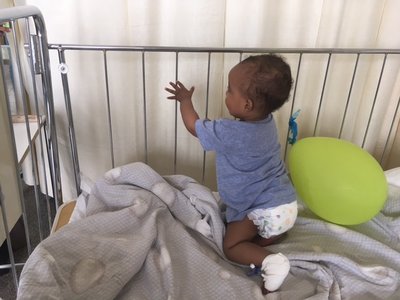Amdi * only 11 months old, appears carefree, playing in his crib at Makarios Hospital, where he was admitted comatose on Thursday morning. His situation was critical, but fortunately stabilised soon after. He may have escaped danger, but his mother has not yet overcome the shock.

Baby Amdi was admitted in critical condition to hospital due to lack of access to the correct milk formula. © UNHCR Cyprus
Looking into the lives of asylum-seekers in Cyprus How is it to be an asylum-seeker in Cyprus? How do these people live? The first nine months they are not allowed to work and thereafter many can’t work, either because they cannot find a job or cannot work in the very limited sectors of the economy they are allowed by law to work, such as farms, animal husbandry, garbage collection and the like. Others have serious health conditions preventing them from being able to work. Is the social assistance they receive from the State adequate to ensure a dignified living for the health and subsistence of these individuals and their families? Who are these people and what do they dream of for the future?
Today we are launching a series of stories that answer most of the above questions and showcase the reality of the daily life of some of these people. At the end of 2016, there were 3,088 asylum-seekers in Cyprus awaiting for a decision on their applications for international protection. Of these, 307 were accommodated at the Kofinou Reception Centre. Another 112 unaccompanied and separated asylum-seeking children are hosted in special reception centres in Nicosia, Larnaca and Limassol. All remaining asylum applicants (2,699) live independently in the community. Some are employed, while others – very few – receive social assistance from the State, but not under the national Guaranteed Minimum Income (GMI) scheme.
According to data from the Welfare Office, only about 20 percent of asylum-seekers living outside reception centres presently receive State social assistance.
For asylum applicants, social assistance is instead provided mostly in-kind, through vouchers, and only a small amount of cash to be used for utilities and other expenses. While GMI for a single person is €760 per month for rental allowance and other expenses, an asylum-seeker only receives €320 per month for rental allowance and other expenses. The GMI allowance is an additional EUR144 per dependent, while for asylum-seekers this amount is EUR25 and caps at 4 dependents, regardless of the total number of children.
In general, the social assistance offered to asylum-seekers is significantly below the risk-of-poverty threshold, which in 2015 stood at €690 per person per month, according to the Statistical Service of the Republic of Cyprus.
********
Amdi * only 11 months old, appears carefree, playing in his crib at Makarios Hospital, where he was admitted comatose on Thursday morning. His situation was critical, but fortunately stabilised soon after. We found him the next day smiling in his crib, under the still terrified gaze of his mother, 23-year-old Aya from Somalia. He may have escaped danger, but his mother has not yet overcome the shock.
“When he was brought in, he was freezing cold, hypoglycaemic, and having convulsions,” said the doctor on duty. According to the doctors, the situation was caused by the milk that the mother gave to her baby, which was long-life milk instead of formula milk for babies. “I had no money to buy baby milk. I was only able to buy long-life milk and I added sugar to make it sweeter. The next coupons won’t be given to me until the end of May. What else could I do?” asks the desperate Aya, the 23-year-old mother from Somalia, her gaze fixed on her little Amdi.
Delays in issuing vouchers for food, and cheques for utilities and other expenses, are commonplace. Aya received her April coupons on April 20th, and had to redeem them until the end of the month when they would expire. Her cash allowance of EUR95 per month for utilities and other expenses is always delayed. In any case, the two shops where the coupons can be used to make purchases do not stock baby formula.
Little Amdi was born in Cyprus last June, and three months later was diagnosed with tachycardia. He had to be closely monitored until the end of last year. His health continued to improve up until last Thursday when he had to be admitted to hospital. Aya was already in the eighth month of her pregnancy when she arrived in Cyprus just one year ago, and in early June she gave birth to Amdi at the Larnaca General Hospital.
Aya has another two sons aged 4 and 3, who remained with her mother-in-law in Somalia when she fled the country. Her husband, a teacher at a government institution, ran away to escape from the extremist organisation, Al-Shabaab, a branch of Al Qaeda. His ‘crimes’ are refusing to cooperate with them. It was only a matter of time until the terrorists would turn against his wife, so Aya had to escape immediately, leaving her two children behind. Since then, she has not heard a word from her husband.
Already under grave distress for little Amdi, and facing anguish over the starvation and the constant uncertainty in which she lives daily, Aya was unable to tell us more details about her journey to Cyprus. “She does not leave her child’s side… she is a very good mother,” said her friend, 27-year-old Lara, also from Somalia.
Once discharged from the hospital, Aya and her Abdi will return home, which is shared with five other women. “The house is fine,” she told us. But the problems with the voucher system will continue to cause unnecessary suffering for this mother and her infant, if no action is taken immediately to improve the system.
* Names changed for protection purposes
Μοιράσου το στο Facebook Μοιράσου το στο Twitter